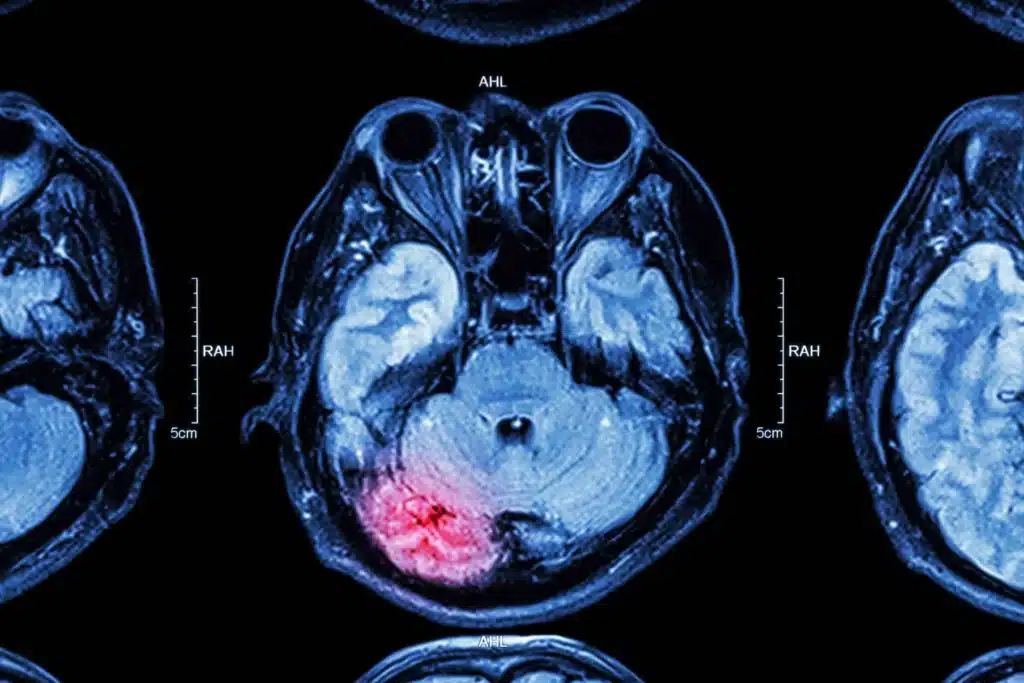New York City Brain Injury Lawyer

-
 Content reviewed by: Alex Shulman
Content reviewed by: Alex Shulman
- Last updated: Jun. 26, 2025
A brain injury could impact every aspect of your life. At the same time, you could be facing major medical bills—both now and in the future. You shouldn’t have to face these challenges on your own. If someone else caused your accident and injury, you can hold them responsible.
A brain injury attorney in New York City can help. While you focus on resting and treating your injury, we can handle the phone calls, file the paperwork, and seek the compensation you need and deserve. At Shulman & Hill, our New York City personal injury attorneys offer personalized legal representation and fight for your best possible results. Schedule a free case review to learn your options and understand your next steps forward.
What Is a Traumatic Brain Injury?
A traumatic brain injury (TBI) results from either a direct or indirect impact on the head. These injuries cause damage to the brain and affect how the brain functions, either temporarily or long-term. A TBI can happen when the head is struck by an object, jolted upon impact during a car crash, or another traumatic event.
According to Mayo Clinic, a TBI can range in severity from mild, such as a case of whiplash, to severe, such as a coma.
Common Causes of Traumatic Brain Injury
A traumatic brain injury may result from an accident or any traumatic force that impacts the head, including:
- Car or other vehicle accidents
- Pedestrian accidents
- Slips and falls
- Sports accidents
- Construction accidents
- Nursing home accident or abuse
- Birth injuries
- Medical malpractice
- Boating accidents
- Assault
- Firearm injury
According to the Centers for Disease Control and Prevention (CDC), the top four causes of brain injury include falls, car crashes, firearm injuries, and assaults. Nearly half of hospitalizations for TBIs result from fall injuries.
Types of Traumatic Brain Injury
Brain injuries can be generally categorized as open or closed head injuries.
- Open (or penetrating) injuries happen when the skull is cracked. A violent assault or even a serious fall can lead to open head injuries.
- Closed head injuries result from an impact on the brain that does not crack the skull. The brain may be shaken or jolted inside the skull, causing bruising or even tearing of tissues in the brain. These are commonly caused by car crashes.
Symptoms of Traumatic Brain Injury
Those facing a traumatic brain injury could experience symptoms immediately after the injury or soon thereafter. Because TBIs range in severity, you may face a wide range of physical, behavioral, or cognitive symptoms including:
- Headache
- Dizziness
- Fatigue
- Sensitivity to light
- Speech challenges
- Coordination issues
- Memory problems
- Changes in sleeping pattern
- Loss of consciousness
- Agitation or other mood changes
- Clear fluids leaking from the ears or nose
- Seizures
Shulman & Hill obtained a $2,500,000 settlement for a non-union laborer
Shulman & Hill obtained a $2,000,000 settlement for an immigrant laborer
Shulman & Hill obtained a $1,600,000 settlement for a 53-year-old union bus driver
Shulman & Hill obtained a $1,500,000 settlement for an undocumented day laborer
Shulman & Hill obtained a $1,500,000 settlement for a bus driver
These symptoms can be challenging enough for victims—on top of the other social, intellectual, and practical consequences of the injury. The short-term or long-term effects of a brain injury can involve:
- Physical challenges: paralysis, muscle spasticity, limits to endurance, tremors, and coordination issues
- Sensory challenges: vision problems, changes in sensory perception, limited sensation, or hypersensitivity
- Language challenges: difficulty with word selection, slowed speech, limited vocabulary, and reading/writing issues
- Social challenges: limited perception of social cues and issues keeping friends
A brain injury can lead to many other long-term challenges in everyday life. In addition, brain injuries can come with substantial medical costs.
As Mayo Clinic notes, brain injury victims may require immediate medical care following the injury. This could include ambulance services from an accident scene, emergency room treatment, diagnostic testing, surgery to address skull fractures or brain bleeding or prevent complications from inflammation.
After these emergency care needs, victims often need to undergo rehabilitation. Depending on the unique challenges and symptoms a TBI victim faces, they may need to begin therapy in the hospital and continue with inpatient rehab over the long term. Rehabilitation may involve:
- Physical therapy
- Occupational therapy
- Psychiatric care
- Speech and language therapy
- Vocational therapy
- Recreational therapy
People with a TBI may also need to work with a case manager or social worker to seek out necessary services. They may also require emotional support or other forms of community support.
Traumatic Brain Injury Statistics in New York State and NYC
Traumatic brain injury is far from uncommon in New York City. With over 8 million people inhabiting the five boroughs, our city is full of activity, which can quickly lead to major accidents. From the bustle of taxi drivers picking up and dropping off passengers to pedestrians crossing at intersections to highway traffic on the Cross Bronx Expressway, New Yorkers all too easily face accidents that can cause brain injuries.
The average number of traumatic brain injury deaths each year in New York City is 763, while the total for the rest of the state is 1,478, per the New York State Department of Health (DOH). That means that about half of all fatal TBI injury accidents in the state occur in New York City. Of course, since New York City comprises just under half of the state’s total population, this figure is not surprising.
New York State sees more than 2,000 deaths from TBI accidents each year, as well as 19,000 hospitalizations and more than 112,000 emergency room visits. According to the DOH, falls, assaults and car accidents are the leading causes of TBI. Both children and the elderly are at the highest risk of sustaining a TBI.

Compensation Could Be Available for Your NYC Brain Injury Case
Living with a brain injury can come with many hardships—financially, socially, emotionally, and interpersonally. If someone else caused your accident or injury, you could seek several forms of compensation to address these losses.
When you bring a personal injury case against the negligent party, you can hold them responsible for your damages, including:
- Medical bills: This can include any necessary care required to treat your injuries, both short and long term. Medications, diagnostic testing, emergency room care, ambulance services, hospitalization, surgery, rehabilitation and physical therapy, visits to specialists, and other forms of medical care can be recovered.
- Lost income: If you missed days at work, you can recover compensation for your missed paychecks, tips, or other forms of missed income.
- Reduced earning capacity: In some cases, your ability to earn income over the long term will be affected by your injury.
- Pain and suffering: This refers to the emotional pain and physical challenges that you face because of your injury. A New York City brain injury attorney can help you determine their value.
- Post-traumatic stress disorder (PTSD): The accident and injury can leave you with significant psychological trauma, requiring counseling to address your symptoms.
- Scarring and disfigurement: Some brain injuries involve serious bodily injuries in addition to head trauma. If you have scarring that affects your appearance, you could seek compensation.
Other damages could be available, depending on how a brain injury affected your life.
When you work with an NYC brain injury attorney from Shulman & Hill, you can explain all the ways the accident and injury affected your life. Then, we can explain all forms of compensation available in your case and how much you could pursue. Our attorneys can work hard to pursue every dollar available to you.
Past Case Outcomes
At Shulman & Hill, we’ve worked with thousands of injury victims to go after the results they deserve. We’ve won more than $700 million in damages for our clients, including many six-figure settlements for serious injury victims—including people with brain injuries.
You can learn more about our past work and results for clients on our verdicts and settlements page.
How a Brain Injury Attorney in New York City Can Help You
When you’re facing painful injuries and overwhelming bills, the last thing you want to do is face a legal battle alone. However, you don’t have to deal with insurance adjusters and submit endless documents to prove that your injuries exist. That’s what our brain injury attorneys are for.
We can handle all tasks involved in an injury claim or lawsuit for you, including:
- Investigating your case to determine liability
- Gathering evidence
- Working with experts to collect additional witness testimony
- Negotiating your settlement or award amount
- Filing a lawsuit and taking your case before a jury if necessary
- Determining how state or local laws may affect your case
- Ensuring you seek the maximum compensation available
- Helping you navigate your brain injury case
In short, our attorneys will handle the entire legal process so that you can focus on what matters most: resting and treating your injuries.

What to Expect When You Bring a Brain Injury Case
One of the biggest benefits of working with a lawyer is having someone on your side who understands the legal process and knows how to go after the best results.
When you hire our team, our NYC brain injury attorney will file a lawsuit and work toward negotiating an out-of-court settlement on your behalf. Our attorneys can often secure a fair settlement without going to trial. They can work with the liable party’s insurance company or other lawyers in the case to negotiate an amount that reflects your damages. If our lawyer thinks it’s not possible to secure a fair settlement through negotiations, we will take your case to trial.
Again, one of the biggest benefits of hiring a lawyer is not having to deal with tasks involved with insurance claims or lawsuits.
Your attorney can file all the paperwork, prepare evidence, cross-examine witnesses, or present your case before a jury while you focus on getting better.
A Lawyer Can Help You With These Common Challenges to Your Case
Your brain injury case may seem straightforward to you: someone else caused your accident or injury, and now you’re facing major life changes and bills. However, the other party’s insurance company or their lawyer may try to downplay your case as much as possible.
Unfortunately, you may encounter many common challenges in your case. The liable party’s representatives may claim that:
- Your injuries aren’t as serious as they are.
- You were partly or primarily responsible for the accident or the injury.
- Your injuries existed before the accident.
- You made your injuries worse through neglect of your medical care.
- Their client was not responsible for your accident or injury.
Our brain injury lawyers in NYC have seen all of these challenges to injury victims’ cases and we know how to handle them.
We can present the facts of your case and counter these common tactics. We can fight for the maximum compensation available in your case.
Schedule a Free Consultation Today from an NYC Brain Injury Lawyer
When you’re suffering from a brain injury someone else caused, you deserve justice and compensation. An attorney from Shulman & Hill can stand by your side through every step of the legal process. Contact our team today for a free case review. We can explain your rights and options, answer your questions, and tell you more about how our NYC brain injury lawyers can help.